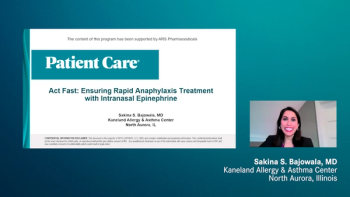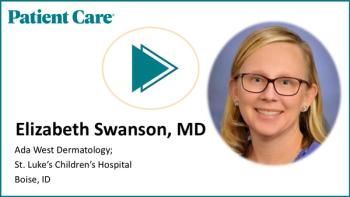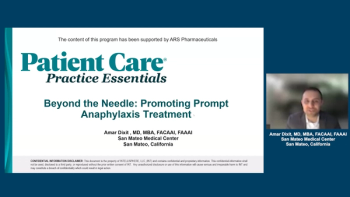
A panelist discusses how Neffy represents a novel intranasal epinephrine delivery system using three FDA-approved components: epinephrine, Intravail absorption enhancer, and a proven nasal spray device already used in other medications.

A panelist discusses how Neffy represents a novel intranasal epinephrine delivery system using three FDA-approved components: epinephrine, Intravail absorption enhancer, and a proven nasal spray device already used in other medications.

A panelist discusses how multiple barriers prevent timely epinephrine use, including patient reluctance to use auto-injectors, lack of device availability, uncertainty about administration timing, and cost concerns, leading to widespread underuse.

A panelist discusses how early epinephrine administration significantly reduces severe complications, prevents progression to life-threatening stages, and decreases the need for additional medical interventions like hospitalization or multiple doses.

A panelist discusses how epinephrine is the first and only evidence-based first-line treatment for anaphylaxis, working through alpha and beta adrenergic receptors to rapidly reverse life-threatening symptoms unlike slower-acting antihistamines.

A panelist discusses how anaphylaxis affects approximately 40 million people in the United States with severe systemic reactions involving multiple organ systems, leading to over 500,000 emergency room visits annually.

RAD 2025: Explore expert insights on chronic hand eczema, its differences from atopic dermatitis, and emerging treatments in this informative video series.

RAD 2025: Lisa Swanson, MD, shares insights on pediatric atopic dermatitis, addressing questions from both a dermatologist's and an allergist's perspective.

Panelist discusses how patient cases demonstrate the importance of considering nonsteroidal agents in patients of color (due to hypopigmentation risks) and elderly patients (due to skin thinning), concluding that effective atopic dermatitis management requires proper moisturizing, appropriate corticosteroid cycling, and proactive twice-weekly maintenance with newer nonsteroidal topicals to prevent long-term complications.

Panelist discusses how referral to dermatology should occur when patients fail to reach treatment goals despite proper skincare, appropriate topical steroid and nonsteroid use, and proactive treatment, emphasizing the importance of maintaining open dialogue about systemic therapy options rather than dismissing them as “last resort” treatments.

Panelist discusses how topical treatment selection should be based on affected body areas, patient preferences for vehicle type, and disease extent, noting that patients prefer topical over systemic therapies and emphasizing the importance of using specialty pharmacies with manufacturer contracts to ensure affordable access through proper prior authorization processes.

nonsteroidal topicals including roflumilast (next-generation PDE4 inhibitor), ruxolitinib (JAK1/2 inhibitor), and tapinarof (aryl hydrocarbon receptor agonist) offer significant improvements in efficacy and tolerability compared with older agents like crisaborole, with clinical trial data showing 30% to 50% of patients achieving complete or near-complete clearance.

Panelist discusses how polling results show varied approaches to second-line atopic dermatitis treatment, emphasizing that topical corticosteroids remain the workforce but require proper usage limits of 1 to 2 weeks to avoid serious adverse effects, while highlighting growing patient concerns about steroid phobia and topical steroid withdrawal syndrome.

Panelist discusses how the current treatment guidelines include 4 classes of topical therapies, with newer nonsteroidal options like JAK inhibitors and PDE4 inhibitors providing effective alternatives to long-term corticosteroid use.

Panelist discusses how proper skin care forms the foundation of atopic dermatitis treatment and emphasizes the importance of proactive rather than reactive treatment approaches using maintenance therapy.

Panelist discusses how to assess atopic dermatitis severity using practical measures like body surface area, itch scores, and quality of life impact rather than complex clinical trial scoring systems.

Panelist discusses how atopic dermatitis presentation varies by age and skin tone, emphasizing that it’s a systemic condition with multiple comorbidities that can be prevented through early aggressive treatment.

Panelist discusses how the atopic dermatitis treatment landscape has evolved with new nonsteroidal topical therapies that can match the effectiveness of corticosteroids without their associated adverse effects and long-term risks.

RAD 2025: Mona Shahriari, MD, underscored the cumulative life impact of atopic dermatitis, reminding clinicians that there is always far more to the condition than meets the clinical eye.

Donna Ryan, MD, highlights how the media has helped to reframe obesity as a chronic disease and how antiobesity drugs are transforming metabolic disease treatment.

Hear experts' takeaways from ACOG 2025 on menopause care, postpartum depression screening, and obesity management.

When asked about her 3 wishes for the future of obesity care, Donna Ryan, MD, told Patient Care that she had just one: access.

Only about 75% of people with a positive result on a stool-based test for colorectal cancer complete screening with a colonoscopy. Fendrick "won't rest" until it's 90%.

Mark Fendrick, MD, thinks that right now, the relative accuracy of blood-based tests for CRC compared with available alternatives is not quite comparable. He explains.

With a population goal of having 80% to 90% of age-eligible Americans screened for colorectal cancer, colonoscopy can not be the initial test for everyone, Fendrick emphasizes.

Never considered the carbon footprint left by a screening for colorectal cancer? Fendrick has and did the research to learn more. He explains in this short video.

Johanna Finkle, MD, outlines how clinicians can adapt weight management counseling during key stages of a woman’s life, from preconception through menopause.

ACOG 2025: Laxmi Gannu, MS, discusses key findings from a provider survey on postpartum depression screening practices, training gaps, and referral patterns.

A panelist discusses how education about anaphylaxis recognition, early epinephrine administration, and addressing barriers like device portability remains crucial, with intranasal epinephrine potentially solving many existing challenges in anaphylaxis management.

A panelist discusses how real-world cases demonstrate both the effectiveness of epinephrine when properly administered and the importance of ensuring patients actually carry their medication, through the stories of a college student with cashew allergy and a child undergoing a peanut challenge.

A panelist discusses how Neffy offers significant advantages over traditional autoinjectors, including longer shelf life (24-30 months), better temperature tolerance, and needle-free administration that addresses several unmet needs in anaphylaxis management.